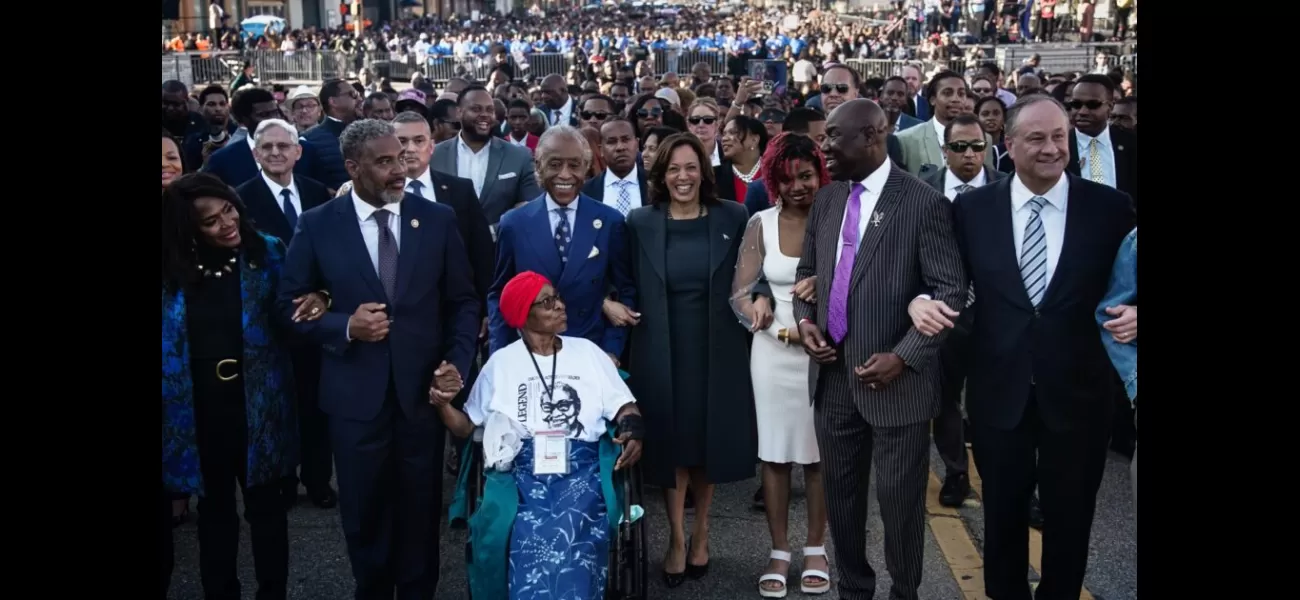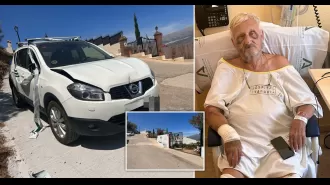Kamala Harris leads 59th annual march on Edmund Pettus Bridge honoring Bloody Sunday.
Harris led a diverse group of supporters across a bridge where many Black individuals were assaulted while fighting for voting rights.
March 4th 2024.

In a historic moment, the first Black woman to hold the position of Vice President in the United States, Kamala Harris, led a march across the Edmund Pettus Bridge just ahead of the 59th anniversary of the tragic Bloody Sunday attacks. Alongside her husband, Doug Emhoff, Harris stood in the same place where civil rights icons like the late Senator John Lewis and Dr. Martin Luther King Jr. were brutally beaten by racist law enforcement officers and civilians in Selma, Alabama on March 7th, 1965 as they marched for voting rights.
Joined by hundreds of supporters, Harris walked arm in arm with civil rights leaders including Rev. Al Sharpton and Ben Crump, paying tribute to those who lost their lives on that fateful day. She acknowledged their bravery and the violent consequences they knew awaited them, stating "Today, we know our fight for freedom is not over because, at this moment, we are witnessing a full-on attack on hard-fought, hard-won freedoms, starting with the freedom that unlocks all others, the freedom to vote."
The story of Selma is a story of our nation, a reminder of the fundamental importance of freedom in the promise of America. And we know that our fight to protect it is far from over. With our feet, our voices, and our votes, we continue to fight for the rights of all Americans.
As the primary elections loomed on March 5th, Harris took the opportunity to condemn numerous attempts to restrict voting rights, including limiting absentee and early voting. In her impassioned speech, she asked the nation to reflect on the type of country they want to live in. "Do we want to live in a country of freedom, liberty, and justice?" she questioned. "Or a country of injustice, hate, and fear?"
The struggle for voting rights, a cornerstone of our democracy, has faced numerous challenges in recent years, with decisions from courts at all levels putting the Voting Rights Act of 1965, signed into law by President Lyndon B. Johnson to ensure the voting rights of Black Americans, under threat. Harris highlighted the divide between those who fought for civil rights and those who seek to restrict them, calling out the "extremists" who are working to limit the rights of Americans on critical issues such as gun violence, voting, and reproductive care.
"Our fundamental freedoms are under assault," Harris stated. "The freedom to vote, the freedom from fear, violence, and harm. The freedom to learn, the freedom to control one's own body, and the freedom to simply be who we are."
This was Harris' second time attending the annual march, which has drawn notable dignitaries in the past, including President Joe Biden, Barack and Michelle Obama, and Bill and Hillary Clinton. This year, prominent attendees included U.S. Attorney General Merrick Garland and U.S. Rep. Terri Sewell, a Selma native. One of the survivors of Bloody Sunday, Eugene Smith, also attended, making his first return to Selma since he crossed the bridge 59 years ago. Reflecting on the events of that day, Smith remarked, "Even today, just remembering what took place, there's nothing over there. It was just to keep us back."
Lawmakers are determined to honor the sacrifices made on that day and ensure that they were not in vain. With the anniversary of the legislation approaching in August, Senate Democrats have re-introduced the John Lewis Voting Rights Advancement Act, which has been stalled since 2021. As Harris continues to advocate for voting rights, her symbolic march across the Edmund Pettus Bridge serves as a powerful reminder of the ongoing fight for equality and justice for all.
Joined by hundreds of supporters, Harris walked arm in arm with civil rights leaders including Rev. Al Sharpton and Ben Crump, paying tribute to those who lost their lives on that fateful day. She acknowledged their bravery and the violent consequences they knew awaited them, stating "Today, we know our fight for freedom is not over because, at this moment, we are witnessing a full-on attack on hard-fought, hard-won freedoms, starting with the freedom that unlocks all others, the freedom to vote."
The story of Selma is a story of our nation, a reminder of the fundamental importance of freedom in the promise of America. And we know that our fight to protect it is far from over. With our feet, our voices, and our votes, we continue to fight for the rights of all Americans.
As the primary elections loomed on March 5th, Harris took the opportunity to condemn numerous attempts to restrict voting rights, including limiting absentee and early voting. In her impassioned speech, she asked the nation to reflect on the type of country they want to live in. "Do we want to live in a country of freedom, liberty, and justice?" she questioned. "Or a country of injustice, hate, and fear?"
The struggle for voting rights, a cornerstone of our democracy, has faced numerous challenges in recent years, with decisions from courts at all levels putting the Voting Rights Act of 1965, signed into law by President Lyndon B. Johnson to ensure the voting rights of Black Americans, under threat. Harris highlighted the divide between those who fought for civil rights and those who seek to restrict them, calling out the "extremists" who are working to limit the rights of Americans on critical issues such as gun violence, voting, and reproductive care.
"Our fundamental freedoms are under assault," Harris stated. "The freedom to vote, the freedom from fear, violence, and harm. The freedom to learn, the freedom to control one's own body, and the freedom to simply be who we are."
This was Harris' second time attending the annual march, which has drawn notable dignitaries in the past, including President Joe Biden, Barack and Michelle Obama, and Bill and Hillary Clinton. This year, prominent attendees included U.S. Attorney General Merrick Garland and U.S. Rep. Terri Sewell, a Selma native. One of the survivors of Bloody Sunday, Eugene Smith, also attended, making his first return to Selma since he crossed the bridge 59 years ago. Reflecting on the events of that day, Smith remarked, "Even today, just remembering what took place, there's nothing over there. It was just to keep us back."
Lawmakers are determined to honor the sacrifices made on that day and ensure that they were not in vain. With the anniversary of the legislation approaching in August, Senate Democrats have re-introduced the John Lewis Voting Rights Advancement Act, which has been stalled since 2021. As Harris continues to advocate for voting rights, her symbolic march across the Edmund Pettus Bridge serves as a powerful reminder of the ongoing fight for equality and justice for all.
[This article has been trending online recently and has been generated with AI. Your feed is customized.]
[Generative AI is experimental.]
0
0
Submit Comment





